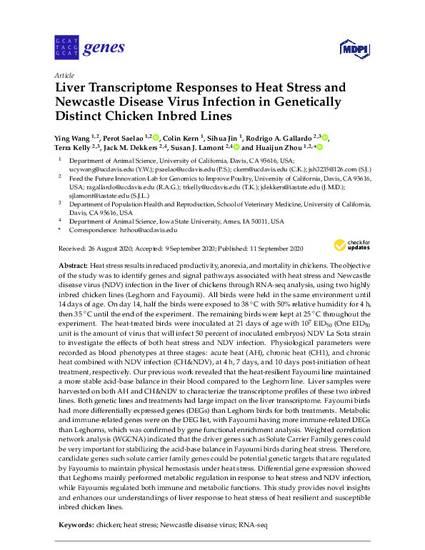
Heat stress results in reduced productivity, anorexia, and mortality in chickens. The objective of the study was to identify genes and signal pathways associated with heat stress and Newcastle disease virus (NDV) infection in the liver of chickens through RNA-seq analysis, using two highly inbred chicken lines (Leghorn and Fayoumi). All birds were held in the same environment until 14 days of age. On day 14, half the birds were exposed to 38 °C with 50% relative humidity for 4 h, then 35 °C until the end of the experiment. The remaining birds were kept at 25 °C throughout the experiment. The heat-treated birds were inoculated at 21 days of age with 107 EID50 (One EID50 unit is the amount of virus that will infect 50 percent of inoculated embryos) NDV La Sota strain to investigate the effects of both heat stress and NDV infection. Physiological parameters were recorded as blood phenotypes at three stages: acute heat (AH), chronic heat (CH1), and chronic heat combined with NDV infection (CH&NDV), at 4 h, 7 days, and 10 days post-initiation of heat treatment, respectively. Our previous work revealed that the heat-resilient Fayoumi line maintained a more stable acid-base balance in their blood compared to the Leghorn line. Liver samples were harvested on both AH and CH&NDV to characterize the transcriptome profiles of these two inbred lines. Both genetic lines and treatments had large impact on the liver transcriptome. Fayoumi birds had more differentially expressed genes (DEGs) than Leghorn birds for both treatments. Metabolic and immune-related genes were on the DEG list, with Fayoumi having more immune-related DEGs than Leghorns, which was confirmed by gene functional enrichment analysis. Weighted correlation network analysis (WGCNA) indicated that the driver genes such as Solute Carrier Family genes could be very important for stabilizing the acid-base balance in Fayoumi birds during heat stress. Therefore, candidate genes such solute carrier family genes could be potential genetic targets that are regulated by Fayoumis to maintain physical hemostasis under heat stress. Differential gene expression showed that Leghorns mainly performed metabolic regulation in response to heat stress and NDV infection, while Fayoumis regulated both immune and metabolic functions. This study provides novel insights and enhances our understandings of liver response to heat stress of heat resilient and susceptible inbred chicken lines.
Available at: http://works.bepress.com/susan_lamont/151/

This article is published as Wang, Ying, Perot Saelao, Colin Kern, Sihua Jin, Rodrigo A. Gallardo, Terra Kelly, Jack M. Dekkers, Susan J. Lamont, and Huaijun Zhou. "Liver Transcriptome Responses to Heat Stress and Newcastle Disease Virus Infection in Genetically Distinct Chicken Inbred Lines." Genes 11, no. 9 (2020): 1067. DOI: 10.3390/genes11091067. Posted with permission.